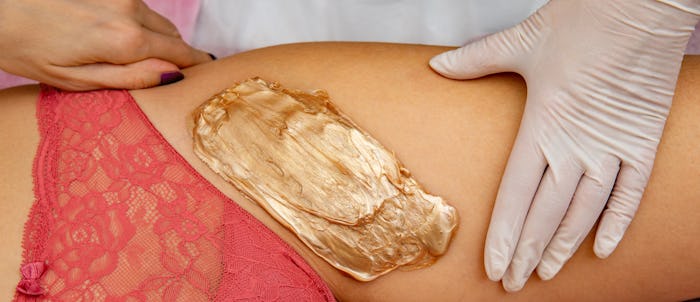Sex

Here's How Long You Should Wait To Have Sex After Getting Waxed
Proceed with serious caution.
Even if intimacy isn’t your primary reason for getting a leg, bikini, or Brazillian wax, it can certainly help boost confidence in the bedroom. However, anyone who’s had a wax of any kind knows the process isn’t exactly fun and can leave the skin inflamed and sore, which begs the question: can you have sex after a wax? The last thing you want to do is irritate the area more — or worse.
A 2019 study of more than 4,400 people found that, of those who regularly get waxed, one of the primary reasons for the decision was based on sexual satisfaction (whether it’s for themselves or their partners). Given this information, it’s safe to assume that a lot of people might feel eager to hop into bed with their partner after a wax, but there can be some serious complications if you’re not careful.
What are the possible risks of sex after a wax?
When asked about the safety of sex after a wax, Jennifer MacGregor, M.D., a board-certified dermatologist at UnionDerm, told Romper that, in general, waxing isn’t great for the skin. “Hot wax irritates the skin and pulls off the protective keratin layer — and sometimes the skin cells too,” she says, “the pulling of the wax causes micro-trauma to the follicles, allowing bacteria and yeast to enter the follicles.” Basically, waxing creates an open wound that can become easily infected, so if someone makes the decision to wax at all, it’s essential that they treat the area with the same attention they would any other skin injury.
Having sex too soon can complicate this healing process and increase the risk of infection. “Add sex to that equation and you get more sweat, bacteria, and yeast rubbing into the traumatized follicles,” says MacGregor. If bacteria does find its way into the hair follicles, one complication you might experience is folliculitis, which MacGregor says “looks like red bumps or pustules.” The American College of Obstetricians and Gynecologists lists folliculitis as a common cause of vulva pain, itching, and burning.
“Having sex after waxing may make you prone to getting STDs (sexually transmitted diseases), such as HPV (human papillomavirus) and molluscum contagiosum,” says dermatologist Shari Lipner, MD, Ph.D. Folliculitis is only the beginning of complications of having sex too soon after a wax.
When can you have sex after a wax?
“I recommend [waiting] 24 hours following waxing to have sex,” says Lipner. This gives the skin time to settle after the traumatic event, which is essential because even if you don’t end up with an infection from having sex too soon after a wax, Lipner points out that the area is still very irritated and the friction of sex can worsen the irritation — so even at best the experience will likely be painful.
That being said, according to MacGregor, don’t expect the area to be fully healed within 24 hours. “Healing takes anywhere from three to seven days post-wax depending on the level of heat and trauma created,” she says, “and it could take up to two weeks to fully heal.” It’s important to pay attention to your body during the healing process and err on the side of caution if you’re still experiencing any kind of pain in the area.
Treatment and when to worry
Thankfully, as painful and annoying as irritated skin and folliculitis may be, it’s easily treatable at home. “If someone has sex and is irritated in the newly waxed area, I would recommend cool compresses several times a day for 5-10 minutes,” says Lipner, “Over-the-counter hydrocortisone can also be helpful for irritation and itch.” However, she says that if you notice bumps in the area that haven’t resolved themselves within one to two weeks, or “if the skin develops pus bumps or the pain is not relieved with home remedies,” this should prompt a call to your dermatologist for further evaluation and diagnosis.
So can you have sex after a wax? The good news is that, if you do decide to get a wax, you don’t have to wait too terribly long to have sex after. Just make sure you’re cautious and listening to your body so that you can hopefully avoid any complications, no matter how minor they may be.
Experts:
Shari Lipner MD, Ph.D., Associate Professor of Clinical Dermatology at Weill Cornell Medicine and physician spokesperson for the American Academy of Dermatology
Jennifer MacGregor, M.D., board-certified dermatologist at UnionDerm
Study referenced:
"To Shave or Not to Shave": “Pubic Hair Removal and Its Association with Relational and Sexual Satisfaction in Women and Men”; Paul Enzlin, Kaat Bollen, Sofia Prekatsounaki; Journal of Sex Med July 2019 https://pubmed.ncbi.nlm.nih.gov/31103484/